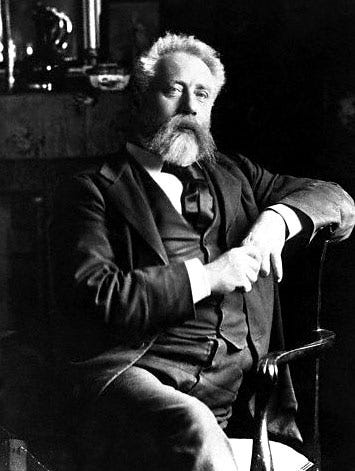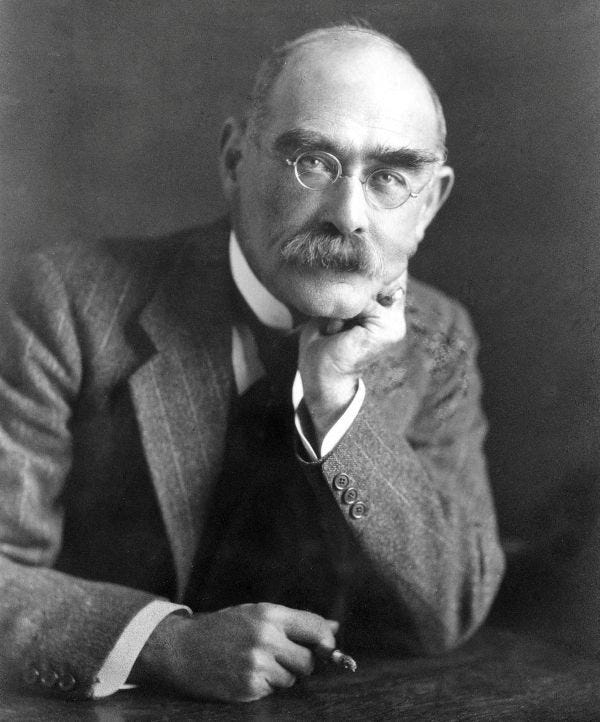William Ernest Henley was a one-legged English poet, writer, critic, and editor most famous for his poem Invictus. Robert Louis Stevenson wrote Henley after the publication of his classic novel Treasure Island to say: "It was the sight of your maimed strength and masterfulness that begot Long John Silver ... the idea of the maimed man, ruling and dreaded by the sound, was entirely taken from you."
Like Stevenson, Henley battled tuberculosis, and while in the hospital in 1873, he wrote Invictus. The poem begins:
Out of the night that covers me
Black as the pit from pole to pole,
I thank whatever gods may be
For my unconquerable soul.
It is the ending, however, that is most often quoted:
It matters not how strait the gate,
How charged with punishments the scroll,
I am the master of my fate
I am the captain of my soul
In March of 2020, a jury in North Carolina found Greg Lindberg guilty of public corruption charges. Convinced the verdict was based on the word of a public official who sat on the stand and perjured himself, Lindberg quoted the end of Invictus in the press and accepted his fate, determined to win the case on appeal.
After decades of working 80-hour weeks to build his successful company, and having no previous criminal record, Lindberg was determined to spend the tens of millions of dollars necessary to fight on. 633 days later, the Fourth Circuit Court of Appeals unanimously overturned Lindberg’s sentence, and he was free. He came out of Federal Prison Camp Montgomery in Alabama determined to fight injustice for all, and wrote a book about his experience “inside.”
Some might think it not surprising that a man that built a $1.4 billion group of companies starting with a $5,000 investment while still in college would win such a battle, but what was most important to Lindberg were the lessons he learned about himself and much less fortunate inmates while at FPC Montgomery.
Lindberg came from the working class. His parents taught that hard work and discipline were rewarded with success. While growing up, he never saw his dad take a day off. The family motto was simply “Do your best.” A ledger from his grandfather showed the family patriarch at one point made a salary of 8¢ an hour, with every bit of income and outlay recorded. Greg Lindberg thought of that when he learned in prison his salary would be 29¢ an hour.
While fighting the court battle that incarcerated him, Lindberg wrote a book about everything he’d learned and practiced while building his company. Failing Early & Failing Often: How to Turn Your Adversity Into Advantage was published just before he reported to FPC Montgomery. In the Acknowledgments he wrote:
I would not be here if it weren't for the kindness and generosity of thousands of people who have encouraged me and coached me along the way, including my parents, teachers, coaches, fellow employees, lawyers, accountants, lenders, friends, family and others too numerous to mention.
That sounds like fairly standard gratefulness expressed by someone putting out their first book, until you are mindful of what Lindberg learned about fellow inmates. All too many of them grew up in unfortunate circumstances and took plea deals to keep family and friends from being charged. Many had no one to “coach them along the way” and came from fractured family backgrounds. As such, all too few of Lindberg’s fellow “cellies” thought of themselves as captain of their soul.
While being a model prisoner determined to do the best job possible with any task given him by the prison, Lindberg learned about the backgrounds of other prisoners, sharing advice when asked. This led to him being asked by the prison to teach classes on business and entrepreneurship.
For the classes. he drew from parts of Failing Early & Failing Often like the Values section, Part Three. which has chapter titles such as Seek Truth, Welcome Pain, Embrace Failure, Maintain Discipline, Transcend Fear, Deepen Faith, Offer Trust, and Remain Humble. Lindberg’s talks were packed, with as many as 100 inmates at a time listening to the personal principles and business management skills that had worked for Lindberg.
He told them how his father was a plumber and auto-mechanic. He told them how changes in regulations had caused his company to lose half its business in less than six months. He shared how he was diagnosed with a brain tumor in 2009 then got back to 100% after a successful surgery. He explained how his company acquired over 100 other companies in the next decade.
It’s one thing to be inspired by a good teacher, but it’s much more potent when that mentor can be seen daily at the labor Lindberg sought to excel at, cleaning prison toilets. In street terms, Lindberg walked his talk, and people paid close attention, learning how they could live different and much more productive lives once they were again in “the free world.”
Greg Lindberg’s second book, written post-prison, is 633 Days Inside: Lessons On Life and Leadership. He fluently describes the personal mental and physical transformation he achieved by using fasting, and the deepened and ongoing empathy he gained from working with and helping the less fortunate. This book has become a project geared toward helping reform an American justice system badly in need of help. The book concludes with written testimonies of how Lindberg’s lessons and example influenced fellow inmates.
Wisdom shared keeps society alive, and great personal examples keep spirits buoyant. It takes intelligence and discipline to see the big picture of life and help others focus on it, so that they take chose right path, even when it is not the easy way.
When someone is captain of their soul, being strong becomes a habit, and conquering the stresses of life is far more navigable. This journey was perhaps best expressed by another famous English writer and poet, Rudyard Kipling.
Kipling wrote the stoic lines of “If” in 1910. It begins:
If you can keep your head when all about you
Are losing theirs and blaming it on you;
If you can trust yourself when all men doubt you,
But make allowance for their doubting too:
If you can wait and not be tired by waiting,
Or being lied about, don't deal in lies,
Or being hated don't give way to hating,
And yet don't look too good, nor talk too wise
His verses that have inspired people for over a century conclude this way:
If you can talk with crowds and keep your virtue,
Or walk with Kings—nor lose the common touch,
If neither foes nor loving friends can hurt you,
If all men count with you, but none too much:
If you can fill the unforgiving minute
With sixty seconds' worth of distance run,
Yours is the Earth and everything that's in it,
And—which is more—you'll be a Man, my son!
On his personal website, Greg Lindberg mentions founding Interrogating Justice, “a non-profit organization whose mission is to bring awareness and help advance solutions that hold corrupt government actors accountable, ensure fairness in sentencing, support reentry, and provide access to justice for all.”
If you share similar sentiments, take a look and perhaps get involved. Those who help others are more likely to be captain of their own soul.
The ebook of 633 Days Inside: Lessons on Life & Leadership can be found on Amazon, GooglePlay, Apple Books and many other major outlets. The paperback is also available at Barnes & Noble and, via IngramSpark, around the world. Through his website www.greglindberg.com, he shares his stories of the fight for justice. Even more to the point, Lindberg’s company, Global Growth, has a stated policy of not turning away potential employees because of a criminal conviction.




